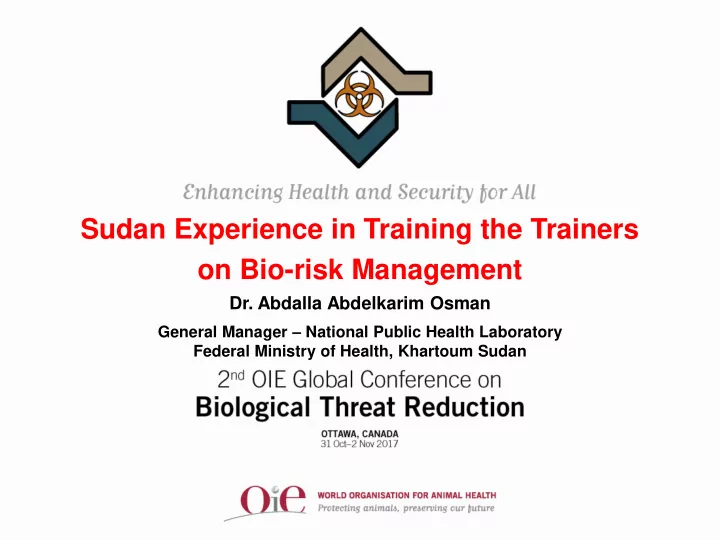

Sudan Experience in Training the Trainers on Bio-risk Management Dr. Abdalla Abdelkarim Osman General Manager – National Public Health Laboratory Federal Ministry of Health, Khartoum Sudan
The Republic of the Sudan • Population of 36 million (2014) • Third largest country of Africa • Capital: Khartoum • 18 States
Facts about Sudan • Occupies a great area in the African continent • Shares borders with seven countries and has a wide diversity in environment and climate • Sudan is an area at great risk for communicable disease outbreaks, in both human and animal population • State economy basically depends on livestock and animal resources which are considered as natural reservoir for many pathogens
Health system in Sudan • Health services by Federal Ministry of Health (FMoH), State Ministries of Health (SMoH), armed forces, police, universities, NGOs & private sector. The health system is divided into 3 levels: National level : national policy development, strategic planning, human resources, emergency preparedness and response, building international relations & partnerships. State level : provide health services, local hospital & assist localities Locality level : primary health care services
German Partnership Program for Excellence in Biological and Health Security Key areas of cooperation:
German Partnership Program for Excellence in Biological and Health Security • Sudan is a key partner in German Partnership program for Excellence in Biological and Health security. • Program was launched by the German Federal Foreign Office in 2013 • Phase 1: 2013 – 2016 • Phase 2: 2017 – 2019 • Part of German engagement in the “Global Partnership against the Spread of Weapons of Mass Destruction” • Implementation jointly with Robert Koch Institute and GIZ
Program Kick-off September 2014
German-Sudanese Partnership Program: Goals • Enhance Sudanese public health capacities • Improve mitigation of biological risks • Foster international scientific exchange and qualify scientific personnel • Contribute to fight against dangerous diseases • Support safe and secure conditions for working with dangerous pathogens and toxins
Setting up B&B Education and Training - Goals B&B Education and Training at different levels at different institutions Solution for long term sustainability : Build up capacity of B&B trainers to train students, laboratory personnel etc. Strengthen the network of B&B
Phase 1 : WS Series „ Strengthening Biosafety & Biosecurity “ • Training-of-Training (ToT) approach • 6 consecutive Workshops (5-10 days): June 2015 - March 2016 • 14 participants from 8 institutions (Laboratory institutions & universities) from Khartoum and Gezira State, Sudan • Incorporates elements of WHO Biorisk Management Course (BRM-ATP) • Implementation of contents in between workshops; reporting on experience (“ homework “)
Training Modules of WS Series 6 workshops, 10 training modules: WS 1: Module “Introduction and general principles” Module “Training -of-Trainers ” Module “Biological laboratory hazards and risks” Part 1 WS 2: Module “Biological laboratory hazards and risks” Part 2 Module “Legislation and ethics” WS 3: Module “Applied laboratory Biosafety” Part 1 WS 4: Module “Applied laboratory Biosafety” Part 2 WS 5: Module “Applied laboratory Biosecurity” Module “Communication” WS 6: Module “ Biorisk management ” Implementation and planning of B&B-ToT
B&B Workshops Phase 1: Impressions
B&B Training-of-Trainers Workshop series Phase 2 Responsibilities • Sudanese “Core group” from phase 1 as facilitator • German colleagues have coordinative role Target group • Appointed biorisk officer of the state public health laboratory (one participant from 18 states) Aims • Strengthening national biosafety & biosecurity capacities on state level • Strengthening training capabilities of phase 1 trainers • Strengthen B&B network
B&B Training Strategy of German- Sudanese Partnership Program Continuous increase of Sudanese capacities
Future Plans and Challenges in the Area of Bio-risk Management Future Plans: • Continuous training and implementation of B&B knowledge on state and federal level • Implementation of B&B by building up bio-risk management system on national and state level Challenges : • Insufficient budget and finance for training • Staff turnover • Sustainability
Thank you Dr. Abdallah Abdelkarim Osman General Manager – National Public Health Laboratory Federal Ministry of Health, Khartoum Sudan abdallahi3@yahoo.com
Recommend
More recommend